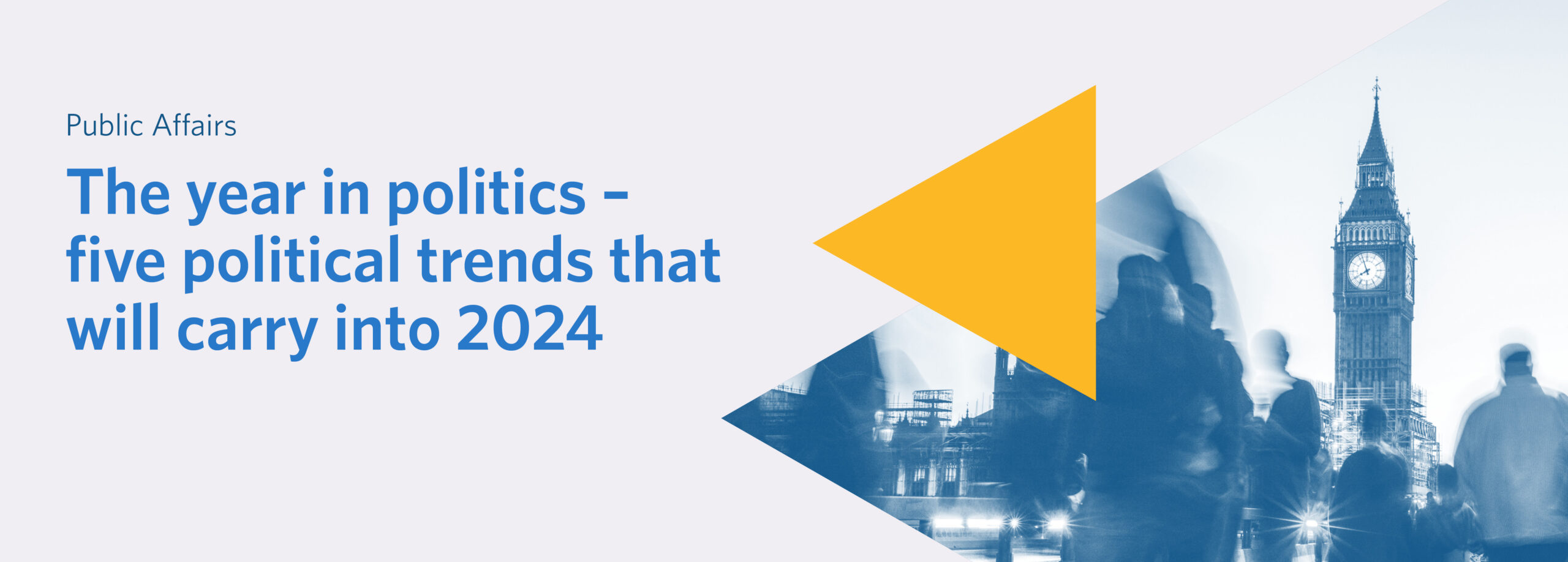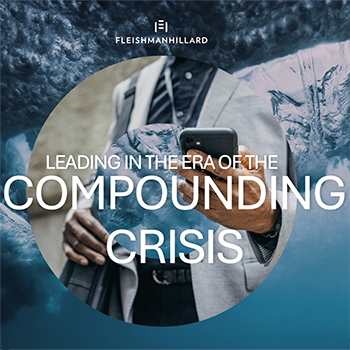
If a week is a long time in politics, then 2023 felt like a decade. The political landscape was tumultuous across the year, marred by a series of political scandals and no fewer than seven parliamentary by-elections, only one of which the governing party won.
These past events, though, will now be viewed through the lens of this year’s general election bringing with it a very real prospect of a change of government – the first in 14 years.
At FleishmanHillard UK, our Public Affairs team have drawn up their list of the top five political trends that defined British politics across the last 12 months and suggest how these might shape events this year and beyond.
1. Rishi Sunak is a lame duck Prime Minister
The Conservatives were in disarray throughout 2023. Catastrophic local election results with the loss of over 1,000 councillors in May, successive by-election defeats, and backbench rebellions on housebuilding targets, offshore wind farms, and immigration, resulted in a difficult ride for Prime Minister Rishi Sunak.
Given all of this, it was perhaps inevitable that speculation grew around whether mutterings of no confidence in the Conservative leader would manifest themselves in yet another leadership contest. The magic number to trigger a confidence vote (and subsequent leadership election) – is 53 letters submitted to Sir Graham Brady, Chair of the 1922 Committee. It is something we will be watching closely for in the coming months as Sunak navigates flashpoint issues like Rwanda.
2. Labour’s charm offensive with business
Last year Labour leader Keir Starmer set out his five missions for government, themed around giving Britain “its future back”. Labour’s National Policy Forum (NPF) then drafted and signed off an extensive policy document over the summer to flesh out more detailed policy priorities and pledges.
Despite the carefully managed process, there were some tensions as Labour sought to reconcile potentially competing interests from business and the trade unions. Notably, Unite gave the NFP document the “thumbs down” and accused the party of rowing back on its plans to bolster workers’ rights in order to “curry favour with big business”.
Labour’s autumn party conference saw a significant increase in the attendance of businesses, lobbyists, and foreign diplomats, with a long waiting list for Business Day tickets. Tony Blair’s chief fundraiser Lord Michael Levy returned to help the party finance its election campaign, and top Labour donors from last year include Lord David Sainsbury, former Autoglass boss Gary Lubner, and financier Stuart Roden.
Labour’s ability to balance, and indeed reconcile, the interests of business with the workforce will be under increasing scrutiny given the tough economic climate and long shadow cast by the cost-of-living crisis.
3. A two horse race? – the fate of the third parties
Nicola Sturgeon’s dramatic arrest and departure from politics early in 2023 threw her party into turmoil. The SNP had entered last year riding high in the Scottish polls, but since the embarrassing police investigation into her and her husband, support for the SNP has been lacklustre and now Labour is regularly polling on a par with the SNP in Scotland. This was compounded by the SNP’s loss of the Rutherglen and Hamilton by-election in October, with a 20% swing to Labour.
Conversely, the Lib Dems enter this year in a stronger position than they have been in recent years, buoyed by their by-election win in Somerton and Frome and strong showing in the May local elections when they gained control of 12 councils in traditional Tory areas.
As we look towards the general election, the Lib Dems hope for a political revival and to overtake the SNP as the third party in Westminster. This would significantly boost their profile and present them with increased opportunities to scrutinise a Labour government – potentially, on some issues, from the left.
4. Tensions arise over the electoral battleground
The Uxbridge and South Ruislip by-election represented a tipping point in British politics. Against all expectations the Conservatives held on to the seat – albeit narrowly – and the backlash on the expansion of the ULEZ scheme was attributed to this. Within weeks, Labour scaled back on their flagship £28 billion a year green investment programme and Starmer all but confirmed that the pledge had been watered down further this January when he stated: “if the fiscal rules don’t allow it then we’ll borrow less”.
The Conservatives, by contrast, doubled down on their attack on the “wokerati” and sought to stoke up culture wars on issues like immigration, trans rights, and free speech, which they believe to be popular rhetoric among their support base and the right-wing media. Labour has tried to be cautious not to get too caught up in these culture wars, instead Starmer proclaimed recently that he wants an election on the economy and is “ready for that fight”.
There are clear tensions between the two parties as they try to determine the playing field on which the general election will be fought, but it appears that this election, much more so than the last, will have a stronger focus on social issues.
5. Elections, elections everywhere…
People are going to the polls not just in the UK, but across the globe this year. Elections are being held in the USA, in Asian countries like India, Pakistan, and Sri Lanka, through to EU member states including Belgium, Portugal, and Croatia, and institutions like the European Parliament.
This means that an incoming British government will need to establish a new set of relationships with new actors right across the world. Geopolitics will therefore remain high on the agenda for British leaders, with opportunities and consequences for not only their international reputation, but their standing in the eyes of their colleagues and the wider public at home.
Against this backdrop, we are helping businesses and organisations to prepare now for political change. We can also help you manage and mitigate risk as well as identify and maximise opportunity on those issues that matter most to you and your stakeholders. Please get in touch with us for further information.
Public Affairs Team, Fleishman Hillard UK
Find Out More
-
Leading in the era of the compounding crisis
October 2, 2025
-
AI in the Newsroom
August 26, 2025


